New Delhi: Jyoti Khatri has been teaching the third chapter from the Hindi textbook Veena to her students for 12 days now. Every day, various administrative tasks pull her out of the classroom. With exams approaching, she will have no option but to rush through and make up for the lost teaching time. It’s a race against syllabus that is likely to impact students too.
Books and uniform distribution, filling out UDISE data, preparing monthly expense statements, opening students’ accounts, maintaining a monthly diary of teachers and the work being done in the classroom, managing other teachers’ records, and handling social media for the school — the list of Khatri’s non-teaching responsibilities is endless. These duties eat into her teaching hours, which was her primary motivation for choosing this job.
“I am doing everything except teaching. I joined this profession because I wanted to teach, but now I’m just handling clerical work,” Khatri lamented, sitting at her home on Sunday with a data sheet on students’ bank accounts.
India’s government school teachers are a burdened lot. Classrooms and syllabus aren’t the only areas they are focusing on. The load of administrative work is resulting in burnout and eating into their personal time. A new approach to teaching, as mandated by the government, stresses on imparting practical knowledge, and requires teachers to spend more time inside classrooms. But opening student accounts, filling data on government portals, spreading swachhata and instilling deshbhakti is also on their task sheets. And the new teaching workforce joining government schools is unequipped to deal with administrative responsibilities as they are not trained in that direction.
I am doing everything except teaching. I joined this profession because I wanted to teach, but now I’m just handling clerical work
— Jyoti Khatri, primary teacher at a govt school
“The focus has shifted from educating students to filling out reports and data sheets. Earlier, teachers used to decide the teaching plan, but now that is being dictated by the ministry. We have become nothing more than puppets of the government,” said 48-year-old Mohan Yadav who teaches in a primary school in southwest Delhi. The new teaching plan stresses more on practical delivery of knowledge, which, according to the teachers, benefits students but is time consuming.
Also read: Govt jobs are changing. PSU bank staff live in pressure cooker, 9-5 replaced by 24×7
Between class and principal’s office
Khatri entered the classroom filled with the noise of 47 children — all boys. The chatter settled once the students rose and said, “Good morning, ma’am”. Khatri took her seat and began taking attendance. As the school’s attendance in-charge, she has to gather data from every teacher and update the principal’s office register after her class. This marks the beginning of the additional tasks she must manage every day.
“It’s been two hours since school started but I haven’t begun teaching yet,” Khatri said, holding a stack of papers that have the details of student bank accounts.
Whenever Khatri is occupied with administrative work, she assigns her students a standard task: “Finish reading this chapter.” Students open their books on their small brown desks and start reading.
“Madam will begin the lesson after lunch, as she does on many days,” remarked a student seated near the back of the classroom.
On average, Khatri visits the principal’s office more than 25 times a day, leaving her class unsupervised. This is when the class monitor steps in.
“Whenever ma’am has other work, she makes me in charge so the class stays quiet. I enjoy it. For a little while, I feel like I’m a teacher too,” said the class monitor.
Each month brings new responsibilities. Now, after the exams, Khatri will need to take extra work home, as she’ll be grading papers and preparing the results. Her husband, an engineer, helps her with this.
“There’s a lot I don’t fully understand about her work, but calculating the marks is something I can manage. So I try to do whatever I can to help,” said Manoj Khatri.
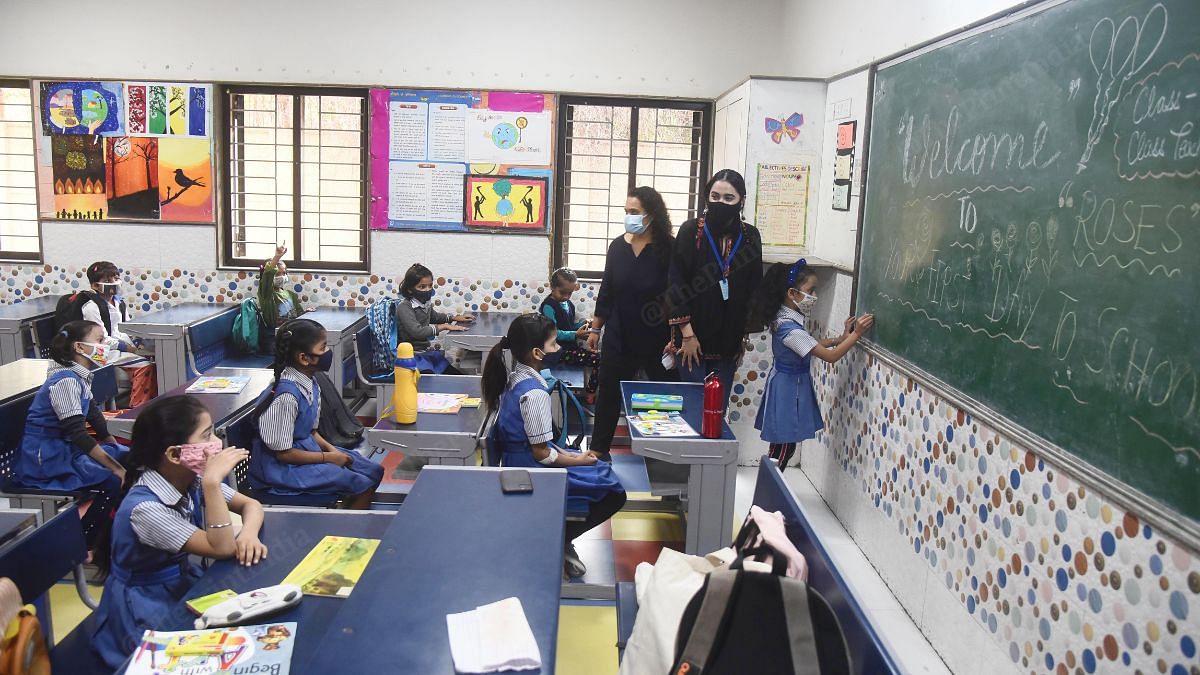
Jyoti Khatri’s day starts at 5:30am and her school, six hours later, at 12:40pm. But throughout the morning, her mind is occupied with the to-do list. Every day, there is a new addition to it. The latest is filling data on different government portals such as UDISE, Edu Del, Edu Life, and Sala Siddhi. She has also been tasked with organising a webinar under the Veergatha project. The Veergatha project started in 2021 and involves teaching children about freedom fighters. Students prepare poems, songs, and essays. The best projects are rewarded.
These government portals are where students’ data gets posted online and their growth is monitored.
In the Unified District Information System for Education (UDISE), Khatri fills in all the information about the students: height, weight, blood group, etc. Data punching isn’t limited to students; schools also have to file their own information on the portal, and there are many other portals where almost the same information needs to be filled.
“I am in charge of UDISE, so I have to ensure that every teacher files it on time. If they face any difficulties, I have to resolve them. It involves three portals. It’s a lot of administrative work that I have to do,” said Khatri.
It’s just been a week since Khatri got done with the Swachhta Pakhwada (fortnight dedicated to cleanliness). The primary school teacher had to help students create posters, slogans, and poems to raise awareness for the Swachh Bharat Diwas on 2 October.
Khatri’s was an arranged marriage, and the family appreciated her profession. They assumed she would only spend six hours in school
Also read: Not all of Haryana’s retired wrestlers join politics. Ticket checkers, police, property dealers
Starting school from home
Khatri has two school-going children. After she sends them off, her mornings get busy with school work — planning her day with activities for her students. There are days when household responsibilities take a back seat.
She doesn’t have time to feed her children and often skips family gatherings. The primary school teacher has recently hired a cook to find some breathing space.
“My life ran between work and the kitchen. I did not have any time for my husband and children, so I decided to hire a cook so at least I can spend a few hours with them,” said Khatri.
Khatri’s was an arranged marriage, and the family appreciated her profession. They assumed she would only spend six hours in school. “But it is not like that anymore. Six hours are just on paper. I bring work home, which upsets my in-laws and husband,” said Khatri who has been teaching for the last 14 years.
Her father was also a government schoolteacher and the only work he brought home was students’ answer sheets.
Teachers in their late 50s had to learn how to use smartphones and the internet. Most of them didn’t even know how to click a picture but now they do all the data collecting and provide a soft copy to the in-charge
— Mahesh Dahiya, who retired 12 years ago as a principal of an MCD school
“I never saw my father ranting about work like I do. He always used to talk about students’ growth, upcoming lesson plans, and how teaching is a very respectable profession. This was the reason I chose this path, but now the entire definition of teaching has changed,” said Khatri.
Mahesh Dahiya, Khatri’s father, retired 12 years ago as a principal from an MCD school. As a teacher, he taught class I to V. All work was manual. All the records were kept in registers. Now everything has shifted to digital.
“Earlier, we used to go to the principal’s room and mark our attendance by signing in the register but now the teachers have to log in from the app within a 100 metre radius of the school. Everything can be checked with one click. In our times, if someone had to check something they had to go through the registers,” said Dahiya.
There is technology to gather data and it has made the process smooth but there is no additional staff to feed this data into the system.
“Teachers in their late 50s had to learn how to use smartphones and the internet. Most of them didn’t even know how to click a picture but now they do all the data collecting and provide a soft copy to the in-charge,” said Dahiya.
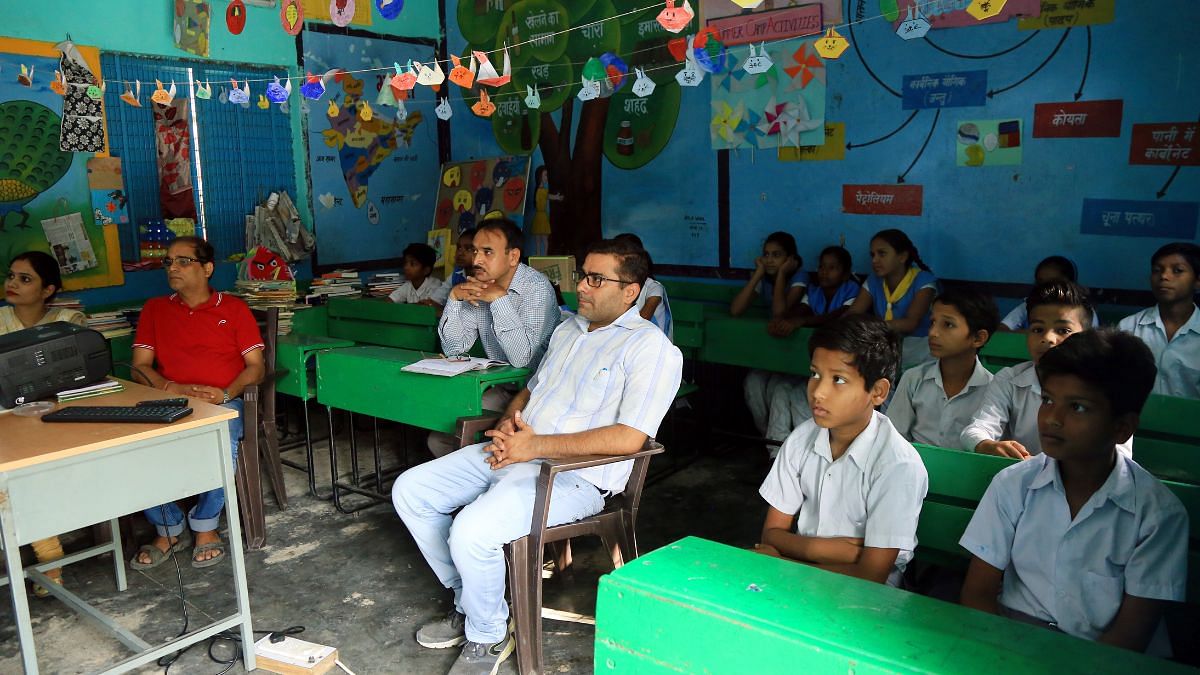
Also read: Sikkim’s war on GLOF. Monks, shamans, scientists are all in the fight
The clerical work
Jyoti Khatri spent her summer holidays going to the school every other day to file data about the personal information of students, their bank account details, and book distribution data. She roamed around the neighborhood to secure admissions. She even had to call her students for bank account details, and it is the teachers’ responsibility.
“An Aadhaar card is required for opening a bank account, but many students don’t have one. Many of them had gone to their villages on vacation. We had to call their parents every day to instruct them to open the bank account, but despite our efforts, we did not succeed,” said Khatri.
The teachers have to invite bank representatives to the schools to assist with opening accounts. Many students lack the required documents. Some banks won’t open zero-balance accounts, and the students don’t have money to deposit. If a mistake occurs, the teachers have to pay the price.
“If the money goes into the wrong account, then teachers have to bear the cost. If something goes wrong in the process, it’s the teacher who has to go to the banks to rectify everything,” she added.
Fifty-nine-year-old Jagdish Yadav is going to retire next year from a school in West Delhi, where he’s the principal. And he has witnessed the changing nature of the job.
The teachers are like Duggal Sahab from the Bollywood movie Mujhse Shaadi Karogi; one day we are clerks, and the next day we are BLO (Booth Level Officer) officers making lists of voters and distributing slips. We follow different policies from state to center, such as Sharda Abhiyan, Shiksha Abhiyan, Nipun Bharat, etc. — Alok Sharma, 37, a teacher at a government school in Hathras
In earlier days of his service, Yadav used to distribute money physically. Students’ parents used to come to the school to collect it. If there is some maintenance work at the school, then the principal used to search for a person and get it done and pay him in cash. Before the mid-day meal, students used to get biscuits, nuts. After the mid-day meal, teachers responsible for executing the scheme used to physically keep the record with minimum columns.
“Now everything is online with many many details and columns. To distribute money, teachers have to open an account, to get something fixed at the school, e-money is being used and every little detail has to be on-record and uploaded online,” said Yadav. “It is like the government does not trust the teachers anymore.”
Teachers admired the steps taken by the government but said the resources are limited.
“Overall growth is required, and it is a very good step for students, but in all of this, the foundation of the students is being compromised. Earlier, parents used to come to the schools for admissions; now we have been given targets to get admissions. Teachers roam the streets in the heat for admissions,” Yadav added.
Jagdish Yadav’s biggest problem right now is getting students to submit the fees for ninth class registration. He has extended the deadline three times but 20 out of 57 students haven’t submitted the fees.
“The registration fee is Rs 300. I have to chase every student in the class, and even after coming home, I call them. I can’t file the data until I have all the information and fees,” said Yadav. “It is just one more pending task on my never-ending list.”
In September, Yadav had to be away from his classes for one week because of training. When he returned, many data reports and pending syllabus welcomed him.
“I get frustrated at times because it gets overwhelming. It’s the students’ education that is suffering,” said Yadav.
Teachers in rural areas have their own set of challenges. They have to visit villages and persuade students to come to school; perform duties related to elections, vaccinations, and the census. They must report how many total voters are in the village, how many are over 60 years old, and gender distribution.
“The teachers are like Duggal Sahab from the Bollywood movie Mujhse Shaadi Karogi; one day we are clerks, and the next day we are BLO (Booth Level Officer) officers making lists of voters and distributing slips. We follow different policies from state to center, such as Sharda Abhiyan, Shiksha Abhiyan, Nipun Bharat, etc.,” said Alok Sharma, 37, who teaches in one of the government schools in a village in Hathras.
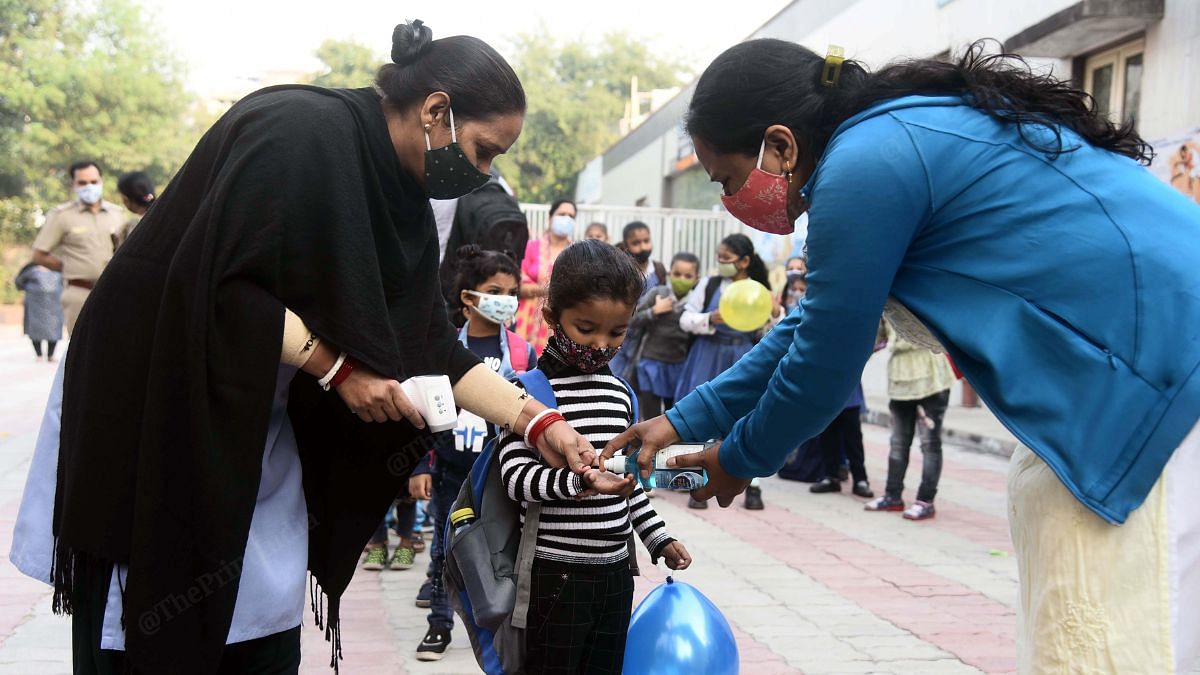
Also read: India’s beef with tallow is older than Tirupati scandal. Jain Shudh Vanaspati shocked Hindus
India needs more teachers
As a principal of a primary school in West Delhi, Yadav has reservations about the fact that guest teachers aren’t getting permanent jobs. Promotions are slow, and vacancies remain unfilled, yet the government isn’t recruiting. The last recruitment in Delhi government schools happened in 2021, and before that, in 2017.
“I will be retiring next year, but those who have to serve for 10 to 15 years are suffering the most. Now they have introduced many technical limitations for promotions. Guest teachers have been around for years, yet they are not getting permanent positions. Nobody is addressing this because there is pressure,” said Yadav.
Chandan Khora is eligible for a promotion. But he is struggling due to new rules introduced in 2022. The new rules say that 75 per cent of the PGT (Post Graduate Teacher) positions will be filled through promotions, while the remaining 25 per cent be filled through direct recruitment. And now, they’ve been revised again and the ratio changed to 50:50.
Earlier, there was no requirement for teachers to have a specific percentage in their master’s degree for promotion. Now, they are required to score at least 50 per cent in their post-graduation. Additionally, if a TGT (Trained Graduate Teacher) teaches English, they can only be promoted to PGT in English. This wasn’t the case earlier and one could teach other subjects too.
I will be retiring next year, but those who have to serve for 10 to 15 years are suffering the most. Now they have introduced many technical limitations for promotions. Guest teachers have been around for years, yet they are not getting permanent positions. Nobody is addressing this because there is pressure–Jagdish Yadav, principal at a govt school
Several teachers ThePrint spoke to said the additional work they are doing should be done by a clerk.
“A teacher has been doing a lot of non-teaching work and the core responsibilities have taken the backseat. The government shows fake numbers in reports. Teachers are not able to teach, officers don’t have any value. They are not doing anything. The extra work has taken over teaching,” said Ajay Veer, General Secretary, Government School Teachers Association in Delhi.
And the shortage of teaching staff accentuates the pain of the faculty.
“Right now, four of my school teachers have gone for training where they are being taught different teaching models and I have had to merge their classes. Some other teachers have to take charge of those classes now. We need more teachers,” said Jagdish Yadav.
In 2013, the education ministry informed Parliament that over 800,000 teaching posts are vacant across India.
“There should be an analysis of how many hours a teacher teaches and how many hours they spend on administrative work. An app can be developed for this as well,” said MK Sridhar, one of the members of the committee that framed the New Education Policy.
“There’s little difference between the job of a private school teacher and that of a government teacher anymore. In fact, we have even more responsibilities, as we must ensure that students and their families benefit from government schemes,” said Mohan Yadav, principal of a primary school in Delhi.
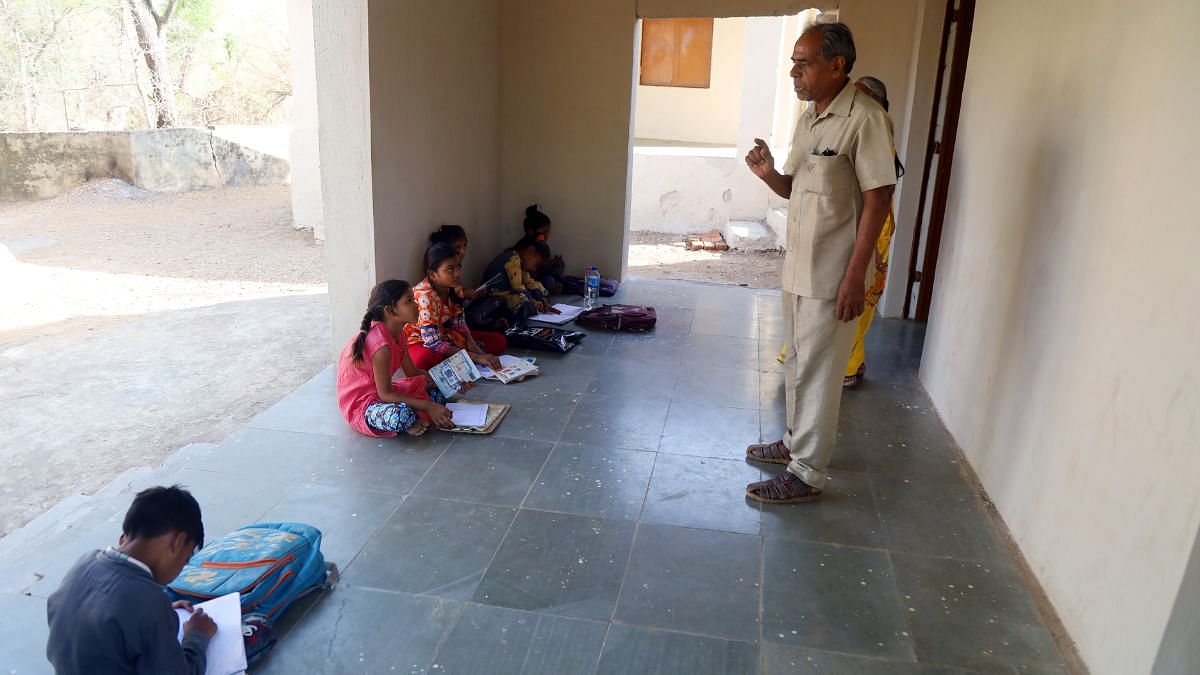
Also read: India’s 1st woman mahout not a fan of tranquilizers to tame elephants. Wants old ways back
‘Appropriate job for women’
Manisha Tomar lives in Delhi and is pursuing a B.ed degree from Indraprastha University. It was not her first choice as a career. But according to her father, being a teacher is one of the ‘appropriate jobs’ for women. Her cousin sisters, brothers, and extended relatives, all are teachers.
“I do hear from all of them that with all the new changes and responsibilities, it is not that noble a job it used to be. But what other options are there?,” said 23-year-old Tomar, adding that she thought it was an easier option to get a secure job compared to the ones that require clearing multiple levels.
According to the All India Survey of Higher Education (AISHE) data, B.Ed. enrollment rose by 221.1 per cent in 10 years — from 436,875 in 2011-12 to 1,402,955 in 2020-21.
“I won’t say that people don’t want to become teachers. In our country, with such a large population, there will always be individuals willing to take any kind of job. But we must acknowledge the shift that has occurred in the teacher’s role over the years,” said Mohan Yadav. “Teachers are more frustrated, always anxious, and living in fear that they can be assigned any task at any moment with a deadline,” he added.
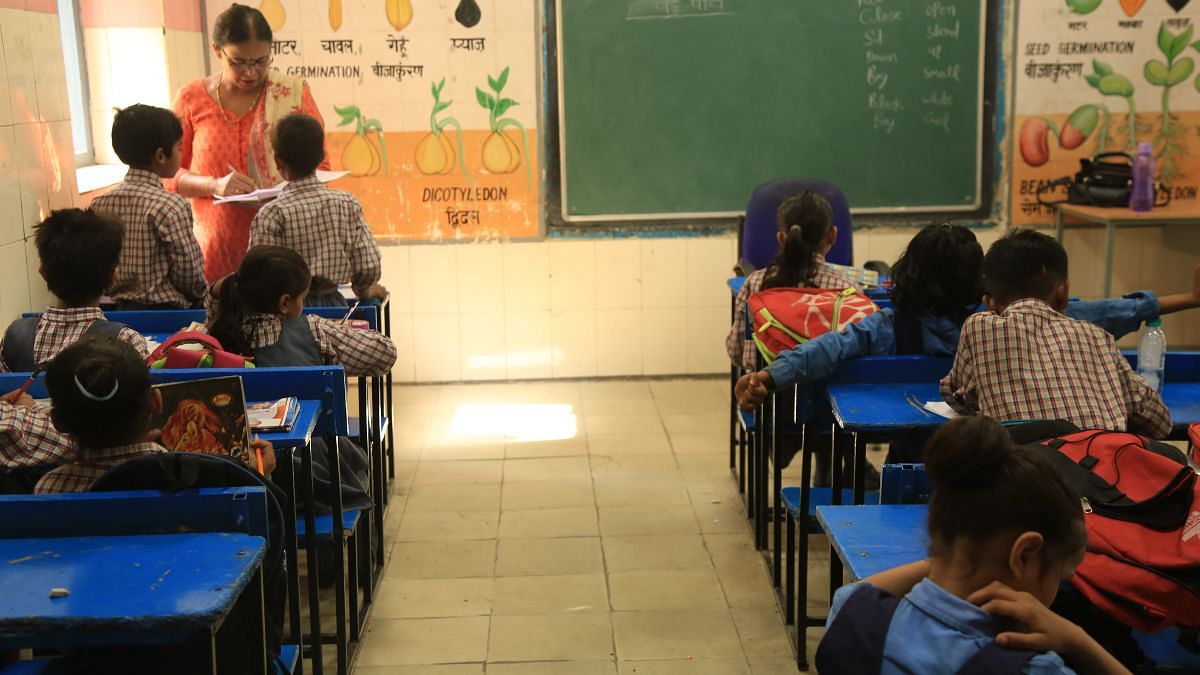
The changing nature of teaching jobs also reflects in the way B.ed courses are being designed. Students are being taught new methods of teaching, in which they are being encouraged to use practical methods.
“Earlier the curriculum was different, we have been taught how you can teach through PPT with the help of different online platforms,” said Tomar. “If we are teaching about a plant, we would take the children to the ground and teach by showing them the plant.”
But the B.Ed course doesn’t prepare teachers for the work that lies outside the classrooms. Filling data sheets is an out of syllabus question they answer every day.
“I was taught about the extracurricular activities and dealing with parents but I did not know that I will have to make so many worksheets and everything will go online and I will be the one doing all this,” said Sunita Soni, who became the teacher in 2022 in Delhi.
Meanwhile, at her school, Khatri moved back and forth between the classroom and the principal’s office. She stopped to interact with another teacher in the corridor, who asked her: “Uploading data again?”
Khatri responded rhetorically. “I wonder when all this will be over and I’ll finally get to teach my class full time.”
“This won’t end anytime soon. It’ll only stop when you retire,” her colleague said, as the duo moved in opposite directions.
The article is part of the ThePrint’s SarkariNaukri series that tracks the changing nature of government jobs.
(Edited by Anurag Chaubey)



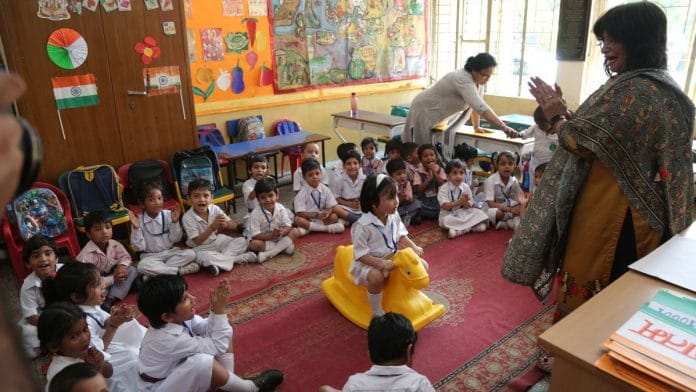



Now govt teachers have to quit their jobs… And start doing some thing else….
Maharashtra vachak , teachers had to upload the reviews of all the class students i e. Around 40 uploads on their websites along with names class division roll no. ..an upheaval task n also crazy
Someone must look into the distress of school teachers in India…. Most neglected, underpaid, working tribe of the country
Hi b.com
This article portrays the reality of school teachers in India. Not only government schools but even in private school the situation is same. This is intentionally done to promote coaching industry. Indian parents have to send their children for coaching because school teachers are not allowed to teach.
I became a teacher because I loved teaching, when I started. Now it has become a tension. As i m doing everything except for teaching.
Medicine distribution, medical camps, EMC money distribution and so many other things keep us away from classes and then they want us to complete our syllabus. How? If , may I ask?